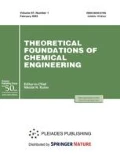Abstract
The initial postulates and mistakes of the existing theory of potential of multicomponent isotope separation have been analyzed. It is shown that problems of deriving the separation potential of a multicomponent mixture are caused by the absence of a correct definition of a stage (separating element) for a cascade. Two variants of the definition of a stage are presented, and the relationship of these definitions with the expression for the separation potential of a multicomponent mixture are demonstrated.




Similar content being viewed by others
REFERENCES
Palkin, V.A. and Igoshin, I.S., Applicability of separation potentials to determining the parameters of cascade efficiency in enrichment of ternary mixtures, J. Eng. Phys. Thermophys., 2017, vol. 90, no. 1, pp. 1–8. https://doi.org/10.1007/s10891-017-1532-y
Sulaberidze, G.A., Borisevich, V.D., and Smirnov, A.Yu., Separation potential for multicomponent mixtures: State-of-the art of the problem, J. Eng. Phys. Thermophys., 2017, vol. 90, no. 2, pp. 251–257. https://doi.org/10.1007/s10891-017-1562-5
Cohen, K., The Theory of Isotope Separation as Applied to the Large-Scale Production of 235U, New York: McGraw-Hill, 1951.
Uranium Enrichment, Topics in Applied Physics, vol. 35, Villani, S., Ed., Berlin: Springer-Verlag, 1979.
Sazykin, A.A., A thermodynamic approach to isotope separation, Izotopy: svoistva, poluchenie, primenenie (Isotopes: Properties, Production, and Applications), Baranov, V.Yu., Ed., Moscow: IzdAT, 2000, pp. 72–108.
Palkin, V.A., Gadel’shin, V.M., Aleksandrov, O.E., and Seleznev, V.D., Multicomponent separation potential. Generalization of the Dirac theory, J. Eng. Phys. Thermophys., 2014, vol. 87, no. 3, pp. 515–523. https://doi.org/10.1007/s10891-014-1040-2
Aleksandrov, O.E., Molecular-kinetic basis of the separation potential, At. Energy (N. Y., NY, U. S.), 2003, vol. 94, no. 6, pp. 411–416. https://doi.org/10.1023/A:1025517214234
Aleksandrov, O.E. and Gadel’shin, V.M., Multicomponent separation potential. Elementary kinetic theory, J. Eng. Phys. Thermophys., 2013, vol. 86, no. 5, pp. 1217–1224. https://doi.org/10.1007/s10891-013-0944-6
Aleksandrov, O.E. and Gadelshin, V.M., Theory of multicomponent separation potential, Curr. Chromatogr., 2015, vol. 2, no. 1, pp. 72–77. https://doi.org/10.2174/2213240601666140804221542
Aleksandrov, O.E., Gadel’shin, V.M., and Shul’gin, B.V., Development of a quasi-ideal cascade of separation elements with three withdrawals, Perspekt. Mater., 2013, no. 14, pp. 65–70.
Aleksandrov, O.E., Gadel’shin, V.M., and Seleznev, V.D., Analysis of promising cascade schemes for connecting four-flow elements with three withdrawals, Al’tern. Energ. Ekol., 2015, no. 23 (187), p. 26.
Author information
Authors and Affiliations
Corresponding author
Additional information
Translated by V. Glyanchenko
Rights and permissions
About this article
Cite this article
Aleksandrov, O.E., Atanov, V.E. Some Aspects of Deriving Multicomponent Separation Potential. Theor Found Chem Eng 54, 240–247 (2020). https://doi.org/10.1134/S0040579519060022
Received:
Revised:
Accepted:
Published:
Issue Date:
DOI: https://doi.org/10.1134/S0040579519060022


